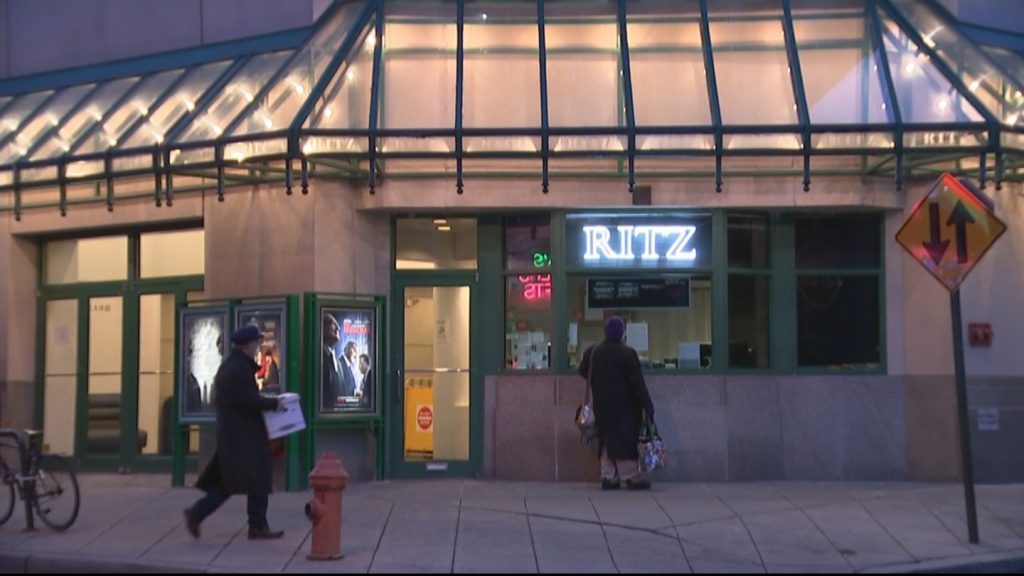This piece was originally written for a blog that doesn’t exist anymore. But I thought that this piece would make for a decent inaugural post for this new website.

I saw Peter Bogdanovich’s The Great Buster (2018) last Sunday at the Ritz Bourse. Every time I am in this particular theater I think of Bertolucci’s The Conformist (1970), Baumbach’s The Squid & The Whale (2005), and Herzog’s Grizzly Man (2005). I saw each of these films for the first time at the Ritz Bourse, and always after lunch in the Bourse cafeteria but before the obligatory trip down toward South Street for TLA Video. The Ritz Bourse, with all its little traditions, was an essential part of my growing up.
While contemplating all of these things in the theater lobby on Sunday I thought of something a student of mine had said to me during the summer. We were discussing modes of spectatorship when this student offhandedly observed that she didn’t really like seeing a film in a theater. This, of course, doesn’t really apply to me because I’d sit through any garbage if I were seeing it projected on the big screen. But it got me thinking, back in the summer and again on Sunday, about the communal aspects of theater going; that it is essential to my love for and understanding of cinema that I join in a private fantasy within a group.
My students, however, were mostly born post-9/11 and have a relationship with cinema that is as caught up with streaming platforms and cell phones as mine was with VHS tapes, VCRs and video stores. Yet, in my experience, what we value as an audience hasn’t really changed despite with our different preferences for spectatorship. A film like Bertolucci’s The Conformist loses none of its effectiveness with the scaling down of the image. In fact, I would argue that great cinema, seen on any scale, retains an effective part of what makes it a work of art.
Now I have been in the lobby of the Bourse for a few minutes and thinking to myself “Gee this would make a good little article” when I suddenly decide to make this piece somehow about what I consider to be the essential moments of my film going life. So I began to catalogue a few of those experiences.
The most unusual experience I had going to see a movie was when I went to see Elaine May’s A New Leaf (1971). This was in 2009 and I had convinced my girlfriend at the time that it would be worth driving two hours to go see this film. So she drove us and we got lost, and two hours became three. Luckily I had planned on us getting sidetracked so I made sure we left with ample time, arriving just as the previews started. It was a beautiful Spring evening for an outdoor screening, with my allergies driving me into fits of nasal outbursts. The lawn was immaculately kept by the church on the property, so it had been freshly mowed for this occasion. Such were the conditions when I saw a 16mm print of A New Leaf projected on the lawn of a church.
The important thing to remember is that in 2009 it was really hard to see A New Leaf. It wasn’t on DVD and it was out of print on VHS. It was one of those films you’d make a copy of from the tape you rented if your video store was hip enough to have a copy. So I would have done anything to see Elaine May’s film at all.
My first experience of truly “cinephilic” proportions came some years prior to A New Leaf when I went with my little brother and my father to the Prince Music Theatre to see all three Godfather films back to back. These were old prints, originals, and that made it really exciting. Not to mention that The Godfather films were “classic masterpieces” to my father, so sharing this experience with him lent the occasion a personal significance. We saw The Godfather, then the superior The Godfather Part II and then we left. My little brother was feeling sick so I never got to see The Godfather Part III, when Michael Corleone fights the Pope, on the big screen.
It’s a sense of dedication that links these two different experiences. A dedication to seeing, experiencing, and sharing the cinema as it happens across the big screen. I think I recall these two instances as being particularly formative largely because they required a greater amount of dedication on my part than most films do. I also know that the people who came with me to share these experiences also share a strong and distinct recollection of these events.
Seeing The Great Buster on Sunday was not as significant as these two events, but it does have some significance; it’s the first film I have seen with my brother and his girlfriend. For me, seeing a film is as much about partaking in an art form as it is a unique social event. That is why people go to the movies, why it is about more than aspect ratios and formats when you see a film on the big screen.
